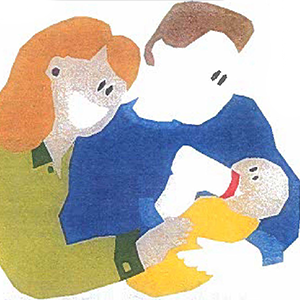Tips for Your 1-2 Month Baby
HELP ME BE HEALTHY
At this checkup:
- I will be weighed and measured.
- I will get a few vaccines. These vaccines help my body fight disease.
- The doctor will ask you if I have had a follow-up hearing test. If I don’t pass this hearing test, I need to see an audiologist. The audiologist will give me a diagnostic hearing test. The doctor will also send us to the nearby Early Childhood Intervention program.
Keep a special notebook for my health journal.
Write about my doctor visits and the times when I’m sick. Take my health journal to my doctor visits so you can write the date that I got my vaccines.
FEED ME OFTEN, I EAT DAY AND NIGHT
Some babies, especially breastfed babies, eat more often on some days.
Follow these tips:
- Holding me while I eat makes me feel safe and loved.

- Breast milk or iron-fortified formula should still be my only food now. Don’t put cereal or other solid food in my formula. My body isn’t ready for solid foods until I’m 4 to 6 months old. Feeding me solids too early might make me have allergies or eat too much.
- If I’m nursing or was born early, my doctor might say I need vitamin drops. Talk to the doctor about this.
How do you know when I’m hungry?
If I’m fussy, it’s okay to try to feed me. I want to nurse or drink iron-fortified formula.
KEEP ME SAFE
- Handle me gently. Don’t pick me up by my arms or swing me by my arms or legs. Don’t shake me or throw me in the air.
- Protect me from falls. Be careful not to fall with me in your arms. Don’t leave me alone on a changing table, bed, or other high place, I could fall.
- If you give me medicine at night, turn on the light and read the label every time to make sure you are giving me the right medicine and the right amount of medicine.
PLAY WITH ME, IT HELPS ME LEARN
- Let me feel different objects by rubbing them against my hands. let me feel some soft and some bumpy materials. I like to feel the different clothes you wear.
- Tell me how special I am. Smile and talk to me a lot.
- Show me bright colors. I can easily see the difference between black and white or red and yellow.
- Put me in a baby carrier or carry me and hold me while you move around the house. Talk to me about what you are doing. I like to see what is happening.
- Look at me when you talk to me. I want to copy your mouth.
- Repeat the sounds I make. I like the game of making sounds.
- Read to me. I like to hear the sound of your voice.
READ ABOUT BEING A PARENT
- Go to your local library for books, magazines, newsletters, and leaflets on parenthood. Use the library’s computers.
- The Mental Health America of Texas website has help for parents at www.parentinginformation.org. Read the section “How to Help Your Crying Baby” or the childcare checklist in the downloadable version of this guide.
- Ask someone you trust to come watch me so you can have a break. Join a group of parents that talks about ways to help children grow. To find parent educators near you, go to the Texas Registry of Parent Educators Resources (ROPER) at www.unt.edu/cpe.
- When you feel stressed, talk to your partner, a family member, or a good friend about your feelings. It helps to talk with someone who is close to you.
WATCH HOW I GROW

- Wave, kick, and squirm when lying on my back.
- Make sounds like “uh,” “eh” and “oh.”
- Look and stare at things. I look at you a lot.
- Lift my head up and turn it side ways when I’m on my stomach.
- Turn to you and smile at you when I see or hear you.
- Quiet down, move my eyes, or change my expression when I hear, your voice or some other noise.
You might notice that I also:
- Cross my eyes sometimes. This is normal. I will do this until my eye muscles get stronger.
- Gurgle, smile, and laugh when I’m happy.
- Have tears when I cry. My tear ducts are starting to work now.
- Like to suck my thumb or pacifier. Sucking is a way that I learn about my world. It is also one way that I calm myself down.
Children are very different from one another.
If I was born early or have special needs, it might take me a little longer to do some things. You can help me learn. If you are worried, talk to my doctor or nurse. To find a nearby Early Childhood Intervention program, call the DARS Help Line toll-free at 1-800-628-5115.
